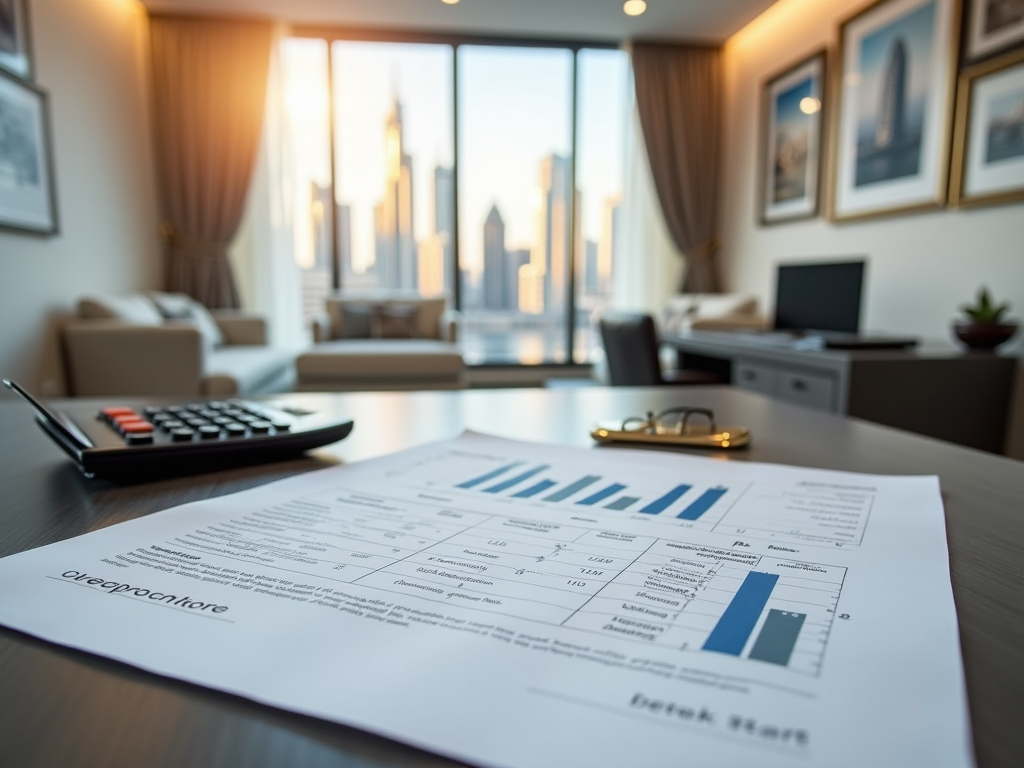Dubai, known for its luxurious lifestyle and booming real estate market, has unique property taxes and fees that buyers and investors need to understand. The tax system is relatively favorable compared to many other global cities, leading to high interest in the property market. This article explores the various taxes and fees associated with purchasing property in Dubai, providing a comprehensive guide for investors and homeowners alike.
Property Purchase Tax in Dubai

The primary tax for property buyers in Dubai is the Dubai Land Department (DLD) fee, which is a one-time tax assessed upon property purchase. This fee is typically 4% of the property’s purchase price, and it is payable at the time of registration. It is essential to budget for this expense when considering a property, as it can significantly impact the overall investment cost. Here are the steps related to the DLD fee:
- Determine the purchase price of the property.
- Calculate 4% of the purchase price.
- Prepare to pay this amount at the DLD during registration.
- Keep receipts for your records.
Additionally, some developers may include a small administrative fee for processing the registration paperwork, which typically ranges from AED 500 to AED 1,100, depending on the value of the property and developer policies. Understanding these fees can prevent unexpected financial surprises for buyers.
Service Charges Associated with Property Ownership

In addition to the purchase tax, property owners in Dubai should consider ongoing service charges, which cover the maintenance and management of communal areas in residential complexes. Such charges vary based on the type of property and its location but generally range from AED 15 to AED 25 per square foot annually. These fees include:
- Maintenance of swimming pools and gyms
- Landscaping and cleaning of common areas
- Security services
- Utility costs for communal facilities
Property owners need to review service charge structures before finalizing their purchase to ensure that these costs align with their financial capabilities. Furthermore, it is advisable to check the property’s management track record since efficient management can greatly enhance the living experience and the property’s overall value.
When purchasing real estate in Dubai, buyers must also factor in other fees beyond the DLD fee and service charges. These costs may include legal fees, valuation fees, and mortgage registration fees if financing the property purchase. Here is a summary of the additional fees:
- Legal Fees: Typically 1% of the purchase price.
- Valuation Fees: Between AED 2,500 to AED 3,500, depending on the valuation company.
- Mortgage Registration Fees: 0.25% of the mortgage amount plus AED 290 for registration.
Calculating these additional costs ensures buyers have a clear understanding of their financial obligations when acquiring property in Dubai. A thorough due diligence process helps in budgeting accurately and avoids overspending.
Taxation on Rental Income
If you purchase property with the intention of renting it out, understanding the taxation on rental income is vital. Fortunately, rental income in Dubai is not subject to income tax, making it an attractive market for investors. However, homeowners are required to pay a 5% administration fee on rental income when registering with the Real Estate Regulatory Agency (RERA). This fee is generally deducted from the total rental income received. Additionally, property owners should be prepared for any short-term fees associated with tenant management and maintenance, ensuring a smooth rental experience.
The Impact of Property Taxes on Investment Decisions
Understanding the property tax system in Dubai is critical for making informed investment decisions. The overall favorable tax regime, combined with the lack of personal income tax, grants real estate investors a distinct advantage compared to other cities. Furthermore, the high demand for property due to Dubai’s growing economy and tourism industry results in potentially lucrative returns on investments. However, potential investors should still conduct thorough research on property valuation, market trends, and applicable fees before making any commitments.
Conclusion
Dubai’s property taxes and fees may initially seem complex, but they are structured to encourage property investment. The primary tax consists of the DLD fee, while ongoing service charges and additional costs must also be considered. By understanding these aspects, potential buyers can make well-informed decisions, avoid unforeseen expenses, and maximize their property investment opportunities in this vibrant market. Proper financial planning and diligence will ensure that your real estate experience in Dubai is not only enjoyable but also profitable.
Frequently Asked Questions
1. Is there any property tax in Dubai?
No, there is no annual property tax in Dubai, but a one-time transfer fee of 4% is applicable on property purchases.
2. What are the average service charges for residential properties in Dubai?
Service charges typically range between AED 15 to AED 25 per square foot annually, depending on the property type and location.
3. Are there taxes on rental income in Dubai?
There is no income tax on rental income in Dubai; however, property owners must pay a 5% administration fee to register with RERA.
4. What is the legal fee for purchasing property in Dubai?
Legal fees are generally around 1% of the property purchase price and should be factored into your overall budget.
5. Do I need to budget for additional costs when buying property in Dubai?
Yes, in addition to the DLD fee, you should budget for service charges, legal fees, valuation fees, and mortgage registration fees if applicable.
